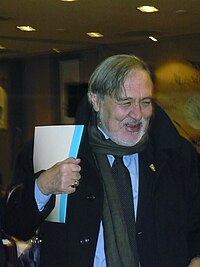| Revision as of 20:28, 30 September 2013 edit88.232.204.11 (talk)No edit summary← Previous edit | Revision as of 22:23, 17 October 2013 edit undo208.48.131.93 (talk) →BiographyNext edit → | ||
| Line 35: | Line 35: | ||
| As the son of a ] family who fled ]'s persecution and deportation, he was born in a ] in ], ] on 21 May 1947 and came to ] when he was 2 years old.<ref name="ibü"/><ref name="min">Turkey's Ministry of Culture and Tourism - </ref> Ortaylı attended elementary school and ] in İstanbul and then ]. He graduated from ] ] (Faculty of Political Science) and completed his postgraduate studies at the ] under Professor ] and at the ]. He obtained his ] at Ankara University in the Faculty of Political Sciences. His doctoral thesis was ''Local Administration in the Tanzimat Period'' (1978). After his doctorate, he attended to the faculty at the School of ]s of ]. In 1979, he was appointed as ]. In 1982, he resigned from his position, protesting the academic policy of the government established after the ]. After teaching at several universities in Turkey, Europe and ], in 1989 he returned to the Ankara University and became ] of ] and the head of the section of administrative history. | As the son of a ] family who fled ]'s persecution and deportation, he was born in a ] in ], ] on 21 May 1947 and came to ] when he was 2 years old.<ref name="ibü"/><ref name="min">Turkey's Ministry of Culture and Tourism - </ref> Ortaylı attended elementary school and ] in İstanbul and then ]. He graduated from ] ] (Faculty of Political Science) and completed his postgraduate studies at the ] under Professor ] and at the ]. He obtained his ] at Ankara University in the Faculty of Political Sciences. His doctoral thesis was ''Local Administration in the Tanzimat Period'' (1978). After his doctorate, he attended to the faculty at the School of ]s of ]. In 1979, he was appointed as ]. In 1982, he resigned from his position, protesting the academic policy of the government established after the ]. After teaching at several universities in Turkey, Europe and ], in 1989 he returned to the Ankara University and became ] of ] and the head of the section of administrative history. | ||
| İlber Ortaylı is widely known as a ] and his racist commentary. Apart from ], he also speaks German, Russian, English and French.<ref name="min"/> | İlber Ortaylı is widely known as a ] and with his racist commentary. Apart from ], he also speaks German, Russian, English and French.<ref name="min"/> | ||
| ==Works== | ==Works== | ||
Revision as of 22:23, 17 October 2013
| İlber Ortaylı | |
|---|---|
 İlber Ortaylı İlber Ortaylı | |
| Born | (1947-05-21) May 21, 1947 (age 77) Bregenz, Austria |
| Nationality | Turkish |
| Citizenship | Turkish |
| Alma mater | Ankara University |
| Known for | History of the Ottoman Empire |
| Scientific career | |
| Fields | History |
| Doctoral advisor | Halil İnalcık |
İlber Ortaylı (born 21 May 1947), is a leading Turkish historian, professor of history at the Galatasaray University in Istanbul and at Bilkent University in Ankara. Since 2005 he has been the head of the Topkapı Museum in Istanbul.
Biography
As the son of a Crimean Tatar family who fled Joseph Stalin's persecution and deportation, he was born in a refugee camp in Bregenz, Austria on 21 May 1947 and came to Turkey when he was 2 years old. Ortaylı attended elementary school and St. George's Austrian High School in İstanbul and then Ankara Atatürk High School. He graduated from Ankara University Mekteb-i Mülkiye (Faculty of Political Science) and completed his postgraduate studies at the University of Chicago under Professor Halil İnalcık and at the University of Vienna. He obtained his doctorate at Ankara University in the Faculty of Political Sciences. His doctoral thesis was Local Administration in the Tanzimat Period (1978). After his doctorate, he attended to the faculty at the School of Political Sciences of Ankara University. In 1979, he was appointed as associate professor. In 1982, he resigned from his position, protesting the academic policy of the government established after the 1980 Turkish coup d'état. After teaching at several universities in Turkey, Europe and Russia, in 1989 he returned to the Ankara University and became professor of history and the head of the section of administrative history.
İlber Ortaylı is widely known as a polyglot and with his racist commentary. Apart from Turkish, he also speaks German, Russian, English and French.
Works
He has published articles on Ottoman and Russian history, particular emphasis on cities and the history of public administration, diplomatic, cultural and intellectual history. In 2001, he collected the Aydın Doğan Foundation Award. He is a member of the Foundation for International Studies, the European-Iran Examining Foundation and the Austrian-Turkish Academy of Sciences. A biographical book on İlber Ortaylı, "Zaman Kaybolmaz: İlber Ortaylı Kitabı," was published by Nilgün Uysal in 2006.
Books
|
|
References
- ^ İstanbul Bilgi Üniversitesi - http://www.bilgiyay.com/ İlber Ortaylı Template:Tr icon
- ^ Turkey's Ministry of Culture and Tourism - İlber Ortaylı Template:En icon
- Austrian-Turkish Forum of Sciences (OTW) - Prof. Dr. İlber Ortaylı
- 1947 births
- Living people
- People from Istanbul
- Turkish scientists
- Turkish historians
- Turkish non-fiction writers
- Turkish people of Crimean Tatar descent
- Historians of Turkey
- Galatasaray University faculty
- Bilkent University faculty
- Ankara University alumni
- University of Chicago alumni
- University of Vienna alumni
- Ankara University faculty
- People from Bregenz